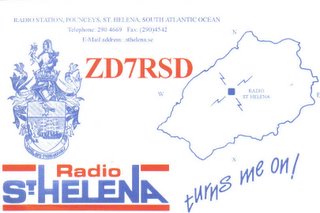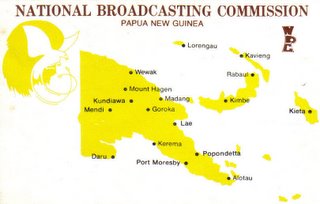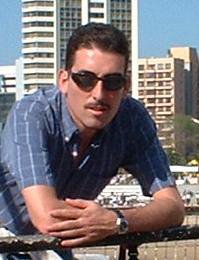Saturday, October 29, 2005
Radio Nacional de España

No, this isn´t a QSL. But I included this pennant from the old Radio Nacional de España because I really like it. Nevermind that I now live in Madrid. The station is now called Radio Exterior de España. Their English broadcasts are a little bit drab but the Spanish transmissions are excellent. I have about three dozen pennants in my collection from different broadcasters. This one I received in 1975, the same year that the monarcy was restored following Francisco Franco´s death.
Radio Clarin, Dominican Republic

This is the largest QSL in my collection. It opens up like a folder. It also holds the record of taking the longest time to receive it. I sent off for it in 1979 and got in the mail in 1984! Radio Clarin had a very popular English program in the early evenings called "This is Santo Domingo" hosted by Rudy Espiñel. Then one day it just disappeared. The broadcasts continued in Spanish, however.
Radio Juventud, Barquisimeto, Venezuela

Juventud is youth in Spanish. Back in the 1970s the Venezuelan broadcasters commanded the tropical bands on shortwave. Radio Juventud along with its sister station Radio Barquisimeto were just two of dozens broadcasting every night. Today, there are only a handful of Venezuelan stations on shortwave. Barquisimeto is the fifth largest city in the country. It´s about five hours outside of Caracas and has some of the best restuarants in Venezuela. My good friend Rafael Sánchez is from Barquisimeto. This QSL is from 1979.
Radio Moscow

"Radio Moscow Doesn´t Believe in Tears" was a saying used by some listeners who had to put up with their dull programs such as "What is Communism" and "Science and Engineering." These guys were the experts in dishing out the propaganda. They had no shame. I remember tuning in one night after the Chernobyl disaster believing I would hear something spectacular. Instead, it was a program about the glorious Soviet victories of World War II. The station is now called the Voice of Russia World Service. "Jolly" Joe Adamov for six decades was a recognizable voice reading and answering listeners letters. Sadly, he passed away on Dec. 21, 2005, according to the VOR. My "fat Russian women" QSL is from 1976.
Voice of America

It is only fair that if I throw in Radio Moscow I should also put the Voice of America online! Afterall, I did work for VOA as a stringer in the Caribbean. I think I read recently that VOA won´t QSL listeners in the United States anymore. Does anyone know something about this? This 1976 QSL is for a broadcast from their old relay transmitter in Bethany, Ohio.
Radio RSA South Africa

This isn´t a rare QSL but I think it´s the only one with the most spectacular view that I have in my 100-plus collection. It shows Tugela Falls in the Royal Natal National Park in South Africa. If you click on the photo you can get a better view. Notice the person standing on the very edge of the cliff on your left. Radio RSA was one of the most popular shortwave stations during the 1970s and 1980s because of their lively programming. But then again they had to strive to be because South Africa wasn´t winning any points with its apartheid policy back then. The station is now called Channel Africa and only broadcasts to the continent. Another loss for the shortwave community.
Radio France Internationale

Again, this isn´t a rare piece but I posted it because I like the lights of Paris and the Moulin Rouge. Never went to the Moulin Rouge (they say it´s a tourist trap) but I saw both movies. RFI, as the station is known, doesn´t broadcast in English to North America but to Africa instead. However, their Spanish broadcasts are well received in North America and are quite good. I tuned them in all the time when I was living in Puerto Rico. This QSL is from 1977.
Radio St. Helena

This was an unusual station. Up until a few years ago, it only broadcast once a year on shortwave in October. The island is one of the most remote places on earth located in the south Atlantic far from South Africa. This is the place where Napoleon was exiled and allegedly poisoned to death. I picked up this broadcast in 1998 in Puerto Rico. I had long given up sending off for QSLs but in this case I couldn´t resist.
Radio Rumbos, Caracas, Venezuela

When I received this QSL card from Radio Rumbos in 1977, little did I know that in 10 years time I would be walking down that same Urdaneta Avenue in downtown Caracas everyday to go to work. The church on the right is part of Santa Capilla, which is perhaps one of the most beautiful churches in the city. It looks like a big wedding cake. This card doesn´t do it justice. Radio Rumbos was an easy catch on 9,660 kHz every night with a live parallel transmission of their AM broadcast. The station is still popular in Caracas among the working class but it is no longer on shortwave.
Radio Berlin International

These guys all won gold medals during a pre-Olympic competition in 1978 that took place in the former German Democratic Republic. They competed in Moscow during the Olympic Games in 1980. Radio Berlin International was one of the more popular stations coming out of the Eastern Bloc in those days. They had lively programs. I wonder what these guys are currently doing now that Germany is reunified.
Radio Tahiti

This was one of my favorite stations when I was kid. Although I didn´t understand French or Tahitian, just hearing island music from so far away during a cold winter night made me wish that one day I would live in a tropical island. My dream came true many years later when I moved to Puerto Rico. This is another legendary station off the air on shortwave.
Radio Luxembourg

I read once somewhere that George Harrison stayed up all night in Liverpool just to hear the first song the Beatles ever wrote played on Radio Luxembourg. This use to be a very popular station in Europe known for its rock played 24 hours a day. You could hear it on shortwave on 6090kHz.Radio Luxembourg can still be heard on the internet with great music and legendary DJs such as Benny Brown and Jim Kent, and in Europe on DRM and longwave.
Radio Tirana
 These guys hated everybody -- Americans, Soviets and Chinese. One of the most reclusive countries in the world, Albania was a very easy catch on radio during the Cold War days. But the programs were dreary. It took many years and various reports before I got a verification from Tirana. I think a lot had to do because mail had to be re-routed to a third country since Albania was closed off to almost everybody. Enver Hoxa, the dinosaur communist leader who died in 1985, really had his people under control. Now somewhat of a democracy, Albania is still the poorest country in Europe.
These guys hated everybody -- Americans, Soviets and Chinese. One of the most reclusive countries in the world, Albania was a very easy catch on radio during the Cold War days. But the programs were dreary. It took many years and various reports before I got a verification from Tirana. I think a lot had to do because mail had to be re-routed to a third country since Albania was closed off to almost everybody. Enver Hoxa, the dinosaur communist leader who died in 1985, really had his people under control. Now somewhat of a democracy, Albania is still the poorest country in Europe.






